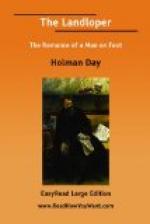“The fifty men he bosses at the ice-house like him because he’s square. Here’s a good motto: ‘Square with the boys and nice to the girls.’ But keep off the street corners, fellows, or they’ll get you mixed up with some of that masher gang.”
The Joyce boy pulled his hat forward and marshaled the retreat from the loafing-place.
“Naw, he ain’t no candidate, nuther,” he informed his associates when they were out of hearing. “He ain’t canvassing for no votes. My old man says he ain’t. He ain’t a four-flusher. He’s the guy that stood for the poor folks up at City Hall and doped out the spring-water stuff.”
At the side of a street where traffic raged to and from the city’s Union Station Farr came upon two shriveled old ladies who were teetering on the curbstones, waiting tremulously for an opportunity to cross. They put down into the roaring street first one apprehensive foot and then another, like children trying chilly water. The big fellow offered an arm to each and led them safely across.
“You’re a real knight-errant, sir,” squeaked one of the two, looking up into the kindly face.
He laughed, doffed the broad-brimmed hat with a low bow, and strolled on his way.
“Knight-errant,” he muttered, still smiling. “Guess not. They don’t have ’em these days. The stories about ’em read well. Wonder what kind of a feeling it was that started those boys off on the hike! Perhaps there wasn’t enough doing in politics. It must have been a fine game, though, rescuing distressed damsels. And all for love and not for pay!”
A poster in the window of an empty store caught his eye just then. It advertised a woman’s-suffrage rally.
“The girls would paint rally signs on a knight’s tin suit these days and send him off on an advertising trip,” was his whimsical reflection.
At that moment, with this thought of knight in armor in his mind, he was attracted by a flare of red fire in a blacksmith shop located just off the street. The one worker in the place was revealed by the forge fire. The glow lighted the features of the man. There was no mistaking him—it was Friend Jared Chick. And Farr turned off the street and went into the shop and greeted his one-time traveling companion.
“How does thee do?” replied Jared Chick, quietly, his Quaker calm undisturbed. He drew forth a white-hot iron and deftly hammered it into a circle around the snout of the anvil.
“So you have given up knight-errantry and have gone back to the old job, have you, Friend Chick?”
“No. This is a part of my service. The man who owns this shop is a good man who works hard here all day. And after he has gone home he allows me to work here in the evening.”
He pounded away industriously and Farr walked up to the anvil to inspect the nature of the work, for the iron rod was assuming queer shapes.
“A new kind of armor, Friend Chick?”




